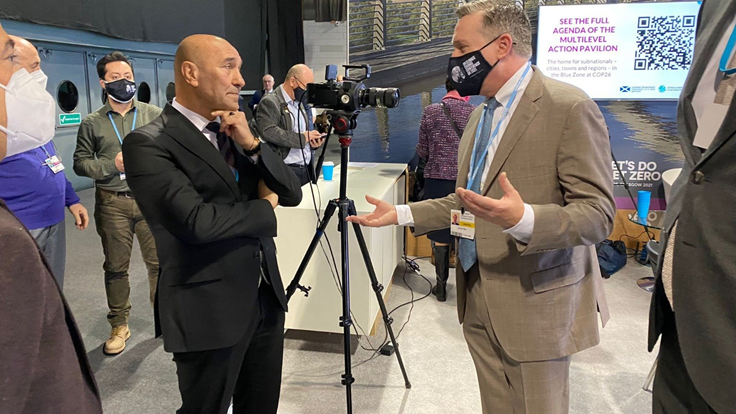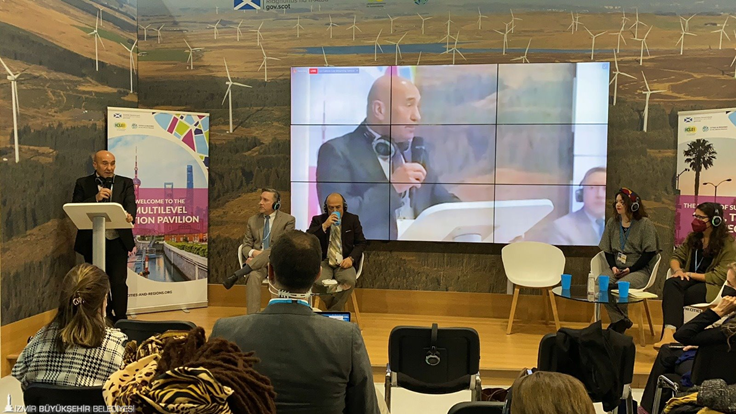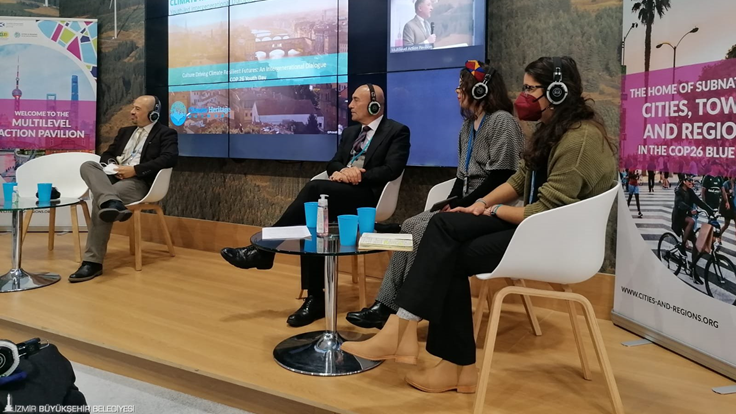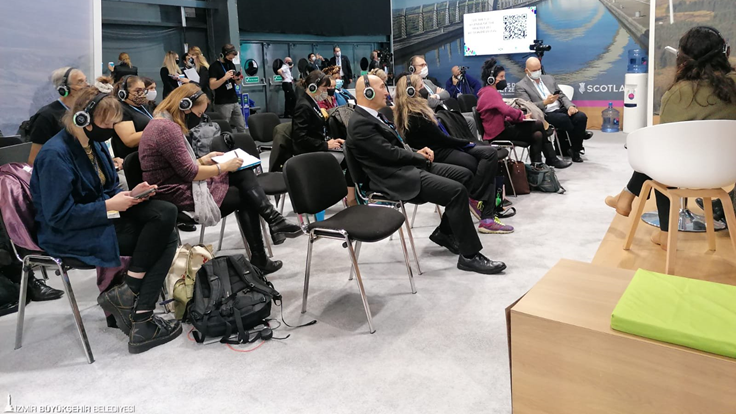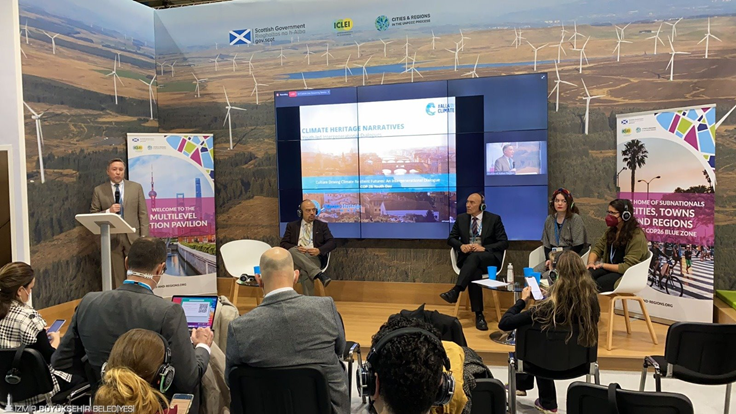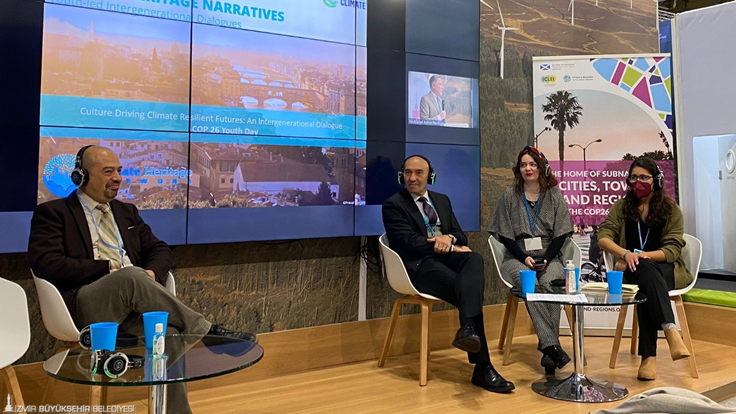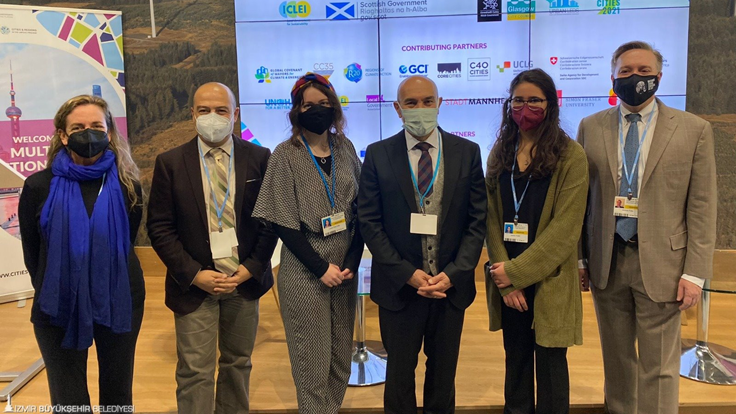Page
Page Content
Mayor Tunç Soyer, speaking at the session heading "Culture Driving Climate Resilient Features: An Intergenerational Dialogue" held by the Union of World Municipalities An Intergenerational Dialogue" said, "While the climate crisis trails the entire world into a great disaster, we, along with my colleagues from all around the world, are working to create new cities that are in harmony with nature at COP26 where I came on behalf of Izmir. Our primary goal is to make Izmir a pioneer city in harmony with nature."
In the first session, Mayor Tunç Soyer started his speech by mentioning the Anatolian legend named Shahmaran. Mayor Soyer said, "Shahmaran legend explains this in summary: Man's ambition is more dangerous than snake venom. The legend of Shahmaran tells us that even if a single person loses his or her conscience, everyone will be harmed. This story that was told hundreds of years before the humanity met the climate crisis did not lose its value today."
Circular culture and climate crisis
At UCLG World Culture Summit held in Izmir in September 2021, Mayor Soyer, emphasizing that they have developed a new concept called "circular culture" to contribute to the solution of the economic and ecological crises that humanity is facing, said, "Circular culture rests on four main pillars: Harmony with our nature. Harmony with the past. Harmony with each other. And finally, harmony with change. People who created art, philosophy, and economics, in other words, culture, by taking inspiration from their nature, one day tore away all the links between them and nature. From this, the climate crisis was born. Therefore, the notion of circular culture is primarily based on harmony with our nature. The second is harmony with the past. I think it's impossible to make a cultural design for the future without understanding the cultures that existed before us. If we want to deliver the cultural change needed by our planet, then this third heading should be a key starting point of us: Harmony with each other. In other words, democracy at every moment of life, respecting the universal values of human rights. Here, our fundamental principle is to ensure equal citizenship by protecting the rights of nature and to ensure inclusion. That is why we see harmony with change as a fourth heading when describing the circular culture. To ensure that the culture is fed by the creativity of new generations and endless sources of inspiration of the nature."
A new urbanism approach: Cittaslow Metropolis
Mr. Soyer, emphasizing that they incorporated the theory behind circular culture into the governance approach of Izmir city with a population of approximately four and a half million just like the circular economy and circular city, said, "We have created concrete examples of implementation. We thus described an urbanism approach accommodating all four titles that I just mentioned: Cittaslow Metropolis is a program committed to implementing the notion of circular culture led by Izmir. This approach considers cities as an ecosystem that nurtures calm and harmony, not populism and autocracy. Cittaslow Metropolis is an innovative model of urban life that combines local and universal values."
ICLEI declaration
Mr. Soyer, stating that the role of cultural transformation in combating the climate crisis is emphasized in the COP26 declaration of ICLEI (Local Governments for Sustainability), of which he is a board member, said the following, "The circular culture concept and the Cittaslow Metropolis approach that we have started implementing in Izmir correspond to exactly this rightful and important sensitivity of ICLEI. I hope that COP26 will adopt decisions that cover the circular culture concept and its principles that are much needed to combat the climate crisis."
Who were the speakers?
In "Culture Driving Climate Resilient Futures: An Intergenerational Dialogue" headed session moderated by Andrew Potts, the Coordinator of the International Council on Monuments and Sites’ Turkish National Committee (ICOMOS) Climate Change Heritage Working Group, Yunus Arıkan, the World Secretary for Local Governments for Sustainability (ICLEI) and the Head of Global Policy and Advocacy, and Isabela Watler, Youth Ambassador for the National Foundation for Cayman Islands, attended as the speakers. Jordi Pascual, Director of Cultural Committee of the Union of World Municipalities (UCLG); Yoloxochitl Lucio Orizaga, ICOMOS official from Mexico; Rim Kelouaze from the African World Heritage Fund Youth Program, Louise Kelly from the Historical Scottish Youth Forum, Pravali Vangeti on behalf of Europa Nostra/ European Association of Students Protecting Cultural Heritage, Marion Cloarec among the REMPART-Heritage Guardian Volunteers, and Lucien Waninsida Zongo on behalf of Ateliers3architectes attended the session online.






